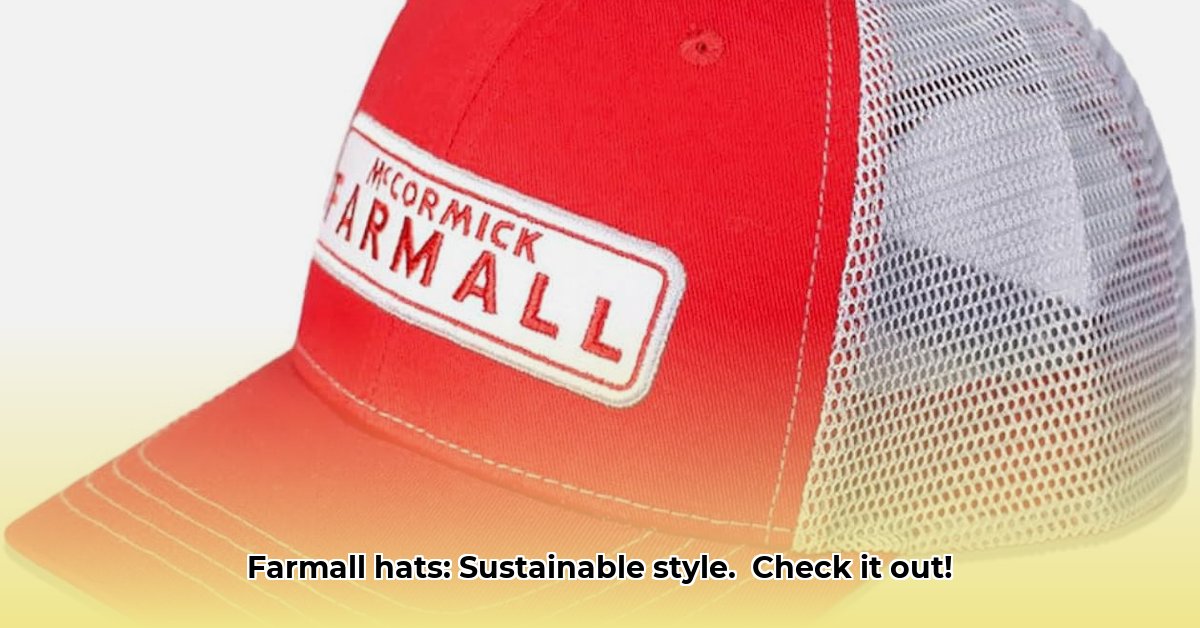
A Legacy Stitched into Every Stitch
Imagine the sun dipping below the horizon, painting the sky with fiery hues. A farmer, weathered by years of sun and toil, rests against their trusty Farmall tractor, the scent of fertile earth lingering in the air. They adjust their well-worn Farmall hat – more than mere headwear, it's a symbol. It's a tangible connection to a rich history, representing not just shade from the sun, but the legacy of International Harvester (IH) and its iconic Farmall tractors. This isn't simply a story about hats; it's a narrative woven from the threads of agricultural innovation, enduring heritage, and the modern push for sustainable farming practices. Learn more about the Farmall legacy here.
From Green Revolution to Sustainable Practices
The Farmall tractors revolutionized 20th-century farming, dramatically increasing efficiency and yields. However, this technological leap wasn't without environmental consequences. Fuel consumption, soil compaction, and overall environmental impact were significant considerations then, unlike the current emphasis on sustainable agriculture. This shift toward farming smarter, not harder, demands innovative techniques and technologies to minimize environmental footprints while maximizing harvests.
How does a simple hat tie into this evolving narrative? The Farmall hat serves as a tangible link to the past, reminding us of how farming has changed and prompting reflection on how we can build upon this legacy to create a more environmentally responsible agricultural future. It invites the crucial question: Can the enduring lessons of the past, embodied by the Farmall, guide us toward a more sustainable path?
The Farmall Hat: A Symbol of Sustainable Style
The production methods of Farmall hats offer a compelling reflection of our values. Are the materials environmentally friendly – organic cotton, recycled fabrics? Are fair labor practices prioritized in their manufacture? These questions are vital, as they influence the hat's overall environmental footprint. In a world increasingly focused on sustainability, the how and what of production are just as important as the style itself.
Envision a future where Farmall hat production actively champions sustainable farming. This could involve collaborations with organizations promoting environmentally responsible agriculture, perhaps even allocating a portion of profits to fund such initiatives. Such a proactive approach would beautifully showcase a commitment to balancing heritage with a greener future, demonstrating that honoring the past doesn't preclude a commitment to the present and future.
Modern Interpretations: Sustainability in Action
The enduring spirit of the Farmall extends beyond its historical significance, powerfully impacting contemporary sustainable agriculture practices. The emphasis on resourcefulness and efficiency echoes in today's innovative farming techniques. This ethos is reflected in the potential for creating Farmall hats from recycled and sustainable materials. This modern approach not only reduces waste but also aligns the brand with its contemporary commitment to environmental stewardship.
Dr. Emily Carter, Professor of Chemical and Biological Engineering at Princeton University, emphasizes this intersection: “Sustainable practices aren't just about environmental responsibility; they're also about economic viability and social equity. A brand like Farmall, with its rich history, has a unique opportunity to lead the way in integrating sustainability throughout its product lifecycle.”
Conclusion: A Legacy for the Future
The Farmall tractor hat is more than just headwear; it's a potent symbol of agricultural heritage and the ongoing quest for sustainable practices. It represents the resilience of farmers throughout history, constantly seeking improvements in food production while increasingly prioritizing environmental responsibility. As we move forward, let the Farmall hat serve as a reminder of the rich legacy we inherit and the vital responsibility we share in building a more sustainable agricultural future for generations to come. The story of the Farmall isn't finished; it's a narrative continuously evolving, shaped by innovation and a deep commitment to responsible land stewardship.